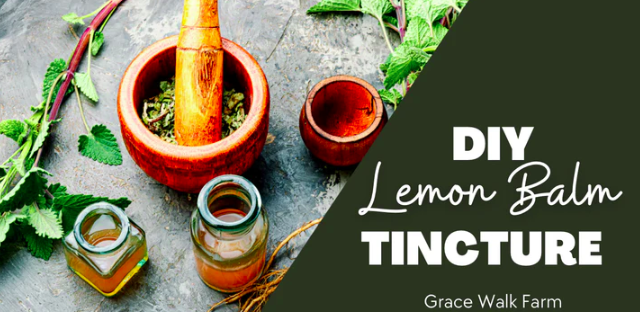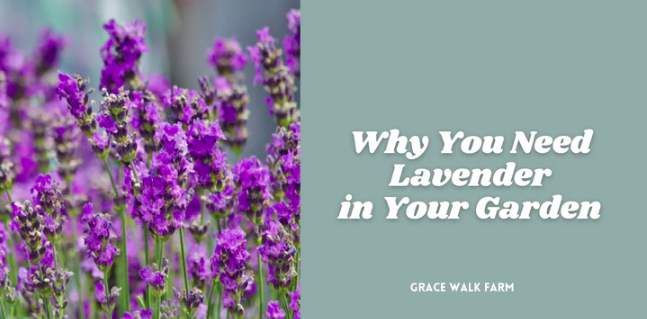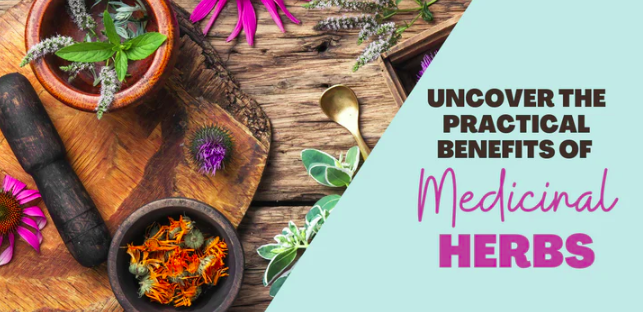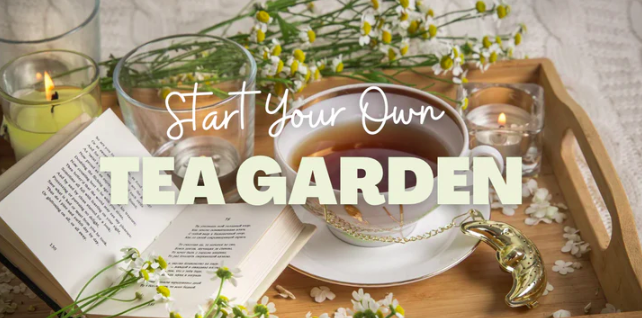Are you looking for a natural and effective way to relieve anxiety, stress, or sleep issues? Then making a lemon balm tincture might be just what you need. Lemon balm has a refreshing citrusy scent and a range of health benefits, from calming the nervous system to protecting against oxidative stress and inflammation. In this article, I’ll show you how to make a lemon balm tincture in a few simple steps, so you can harness the full power of this amazing herb. Let’s get started!
Welcome to Grace Walk Farm, our family homestead in western NC. We share the highs and lows of our homestead journey, in hopes that it will encourage you to grow your own food too. Click here to grab our Beginner Garden Guide for free! Join our 600K strong Instagram community of homesteaders here. Thanks for stopping by!

Growing Lemon Balm
Lemon balm is a hardy and low-maintenance herb that grows vigorously. It is part of the mint family and multiplies quickly, coming back year after year. It prefers full sun to partial shade and thrives in moist soil. You can grow it from seeds or cuttings, but the latter is much easier and quicker. Plant the cuttings about 12 inches apart in your garden, and watch them grow into lush, green foliage.
Keep in mind that lemon balm will spread quickly, especially if you allow it to flower and drop seeds. If you are worried about it taking over a small garden space, you can grow lemon balm in containers or pots to keep it contained to a small area. Just remember that if you are growing lemon balm in containers, it will need more frequent water and fertilizer as containers dry out quickly and the plant will use up the nutrients sooner than it would it it was planted in the ground.

Harvesting Lemon Balm
The best time to harvest lemon balm is in the early morning when the leaves are dry, and the essential oils are at their peak. You can use a pair of sharp scissors to snip off the top leaves, leaving the lower ones to continue growing. Lemon balm is a prolific grower, so don’t be afraid to prune it regularly to encourage bushier growth.
As a general rule when you harvest lemon balm, the more you cut, the more it will grow. Lemon balm will become a tall bushy plant eventually. My lemon balm plant is 3 years old and it is about 5 feet tall (almost taller than me!). I continue to go out and harvest regularly. I cut it halfway down and it seems to grow back practically overnight. It is a prolific herb with so many wonderful medicinal uses for your family.

Uses and Benefits of Lemon Balm
Lemon balm has been used for centuries as a natural remedy for a range of health issues, including anxiety, insomnia, digestive disorders, and skin problems. It’s rich in antioxidants, flavonoids, and rosmarinic acid, which help to protect the body against oxidative stress and inflammation. It also has a calming effect on the nervous system, making it an ideal herb for stress relief and relaxation.
Some research has shown lemon balm to be effective for helping with pain from shingles. It is a nervine herb, meaning it calms the nervous system. If you struggle with adrenal disorders, hormone imbalance, PTSD, memory problems, or even dementia, lemon balm may be a helpful herb for you to explore.
Ways to Use Lemon Balm
There are numerous ways to use lemon balm, from making tea to adding it to your favorite recipes. Here are some ideas:
- Lemon balm tea: Steep a handful of fresh lemon balm leaves in hot water for 5-10 minutes for a refreshing and soothing tea.
- Lemon balm pesto: Blend lemon balm leaves, garlic, parmesan cheese, pine nuts, and olive oil to make a delicious and nutritious pesto sauce.
- Lemon balm ice cream: Infuse cream with lemon balm leaves, then use it to make homemade ice cream for a refreshing and zesty dessert.

How To Make Lemon Balm Tincture
If you want to harness the full benefits of lemon balm, then making a tincture is an excellent way to do so.
Here’s a simple recipe to get you started:
Ingredients:
- 1 cup fresh lemon balm leaves
- 1 1/2 cups vodka, 80 proof
- 1 clean glass jar with a tight-fitting lid
Directions:
- Wash and dry the lemon balm leaves.
- Place the leaves in the glass jar.
- Pour the vodka over the leaves, making sure they are fully submerged.
- Close the jar tightly and shake well.
- Store the jar in a cool, dark place for 2-4 weeks, shaking it every few days.
- Strain the liquid through a cheesecloth or coffee filter into a clean glass bottle.
- Label the bottle with the date and contents, and store it in a cool, dark place.
To use the tincture, take 1/2 – 1 teaspoon up to three times a day as needed for anxiety, stress, or sleep support. It can also be applied topically to soothe skin irritations and insect bites.
In conclusion, lemon balm is a versatile herb that not only adds flavor to your dishes but also provides a range of health benefits. Whether you grow it in your garden, make tea or pesto with it, or use it to make tinctures, lemon balm will be a new favorite in your herb garden.
Keep Learning About Herbs and Plant Medicine



Also check out these blogs:




